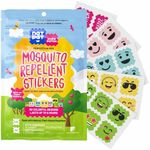Buying Guide for the Best Mosquitos Repellents
Choosing the right mosquito repellent is crucial for ensuring your comfort and safety, especially in areas where mosquitoes are prevalent. The right repellent can protect you from mosquito bites, which can be more than just annoying; they can also transmit diseases. When selecting a mosquito repellent, consider factors such as the duration of protection you need, the type of activity you'll be engaging in, and any skin sensitivities you might have. Understanding the key specifications of mosquito repellents will help you make an informed decision that best suits your needs.Active IngredientThe active ingredient in a mosquito repellent is the chemical that repels mosquitoes. Common active ingredients include DEET, picaridin, oil of lemon eucalyptus, and IR3535. DEET is known for its long-lasting protection and is effective against a wide range of insects. Picaridin is less greasy and has a milder odor, making it a good alternative for those sensitive to DEET. Oil of lemon eucalyptus is a natural option, suitable for those looking for plant-based solutions, but it may not last as long. IR3535 is gentle on the skin and often found in products for children. Choose an active ingredient based on your skin sensitivity, the duration of protection you need, and your preference for natural versus synthetic options.
ConcentrationThe concentration of the active ingredient in a mosquito repellent determines how long the protection will last. Higher concentrations typically offer longer protection. For example, a repellent with 30% DEET might provide protection for up to 6 hours, while a 10% concentration might last for about 2 hours. If you plan to be outdoors for an extended period, a higher concentration might be necessary. However, for short outings or if you have sensitive skin, a lower concentration could be sufficient. Consider your activity duration and skin type when choosing the concentration.
Formulation TypeMosquito repellents come in various formulations, including sprays, lotions, wipes, and wearable devices. Sprays are easy to apply and cover large areas quickly, making them ideal for outdoor activities. Lotions can be more precise and are less likely to be inhaled during application, which is beneficial for sensitive individuals. Wipes are convenient for travel and quick touch-ups. Wearable devices, such as bracelets, offer a hands-free option but may not provide as comprehensive coverage. Choose a formulation based on your convenience, application preference, and the level of coverage you need.
Duration of ProtectionThe duration of protection indicates how long the repellent will effectively keep mosquitoes away. This is often linked to the concentration of the active ingredient. If you are planning a short outdoor activity, a repellent with a shorter duration might suffice. For longer activities, such as hiking or camping, you will need a repellent that offers extended protection. Always check the product label for the estimated duration and reapply as needed to maintain effectiveness.
Skin SensitivitySkin sensitivity is an important consideration when choosing a mosquito repellent, especially for those with allergies or sensitive skin. Some active ingredients, like DEET, can cause irritation in sensitive individuals. In such cases, opting for a repellent with a lower concentration or a different active ingredient, such as picaridin or IR3535, might be more suitable. Additionally, natural options like oil of lemon eucalyptus can be gentler on the skin. Always perform a patch test before full application to ensure there is no adverse reaction.















